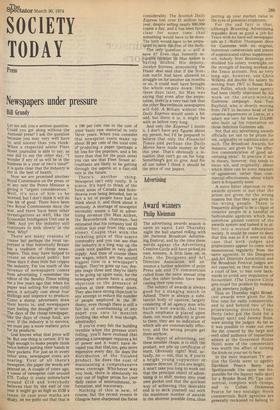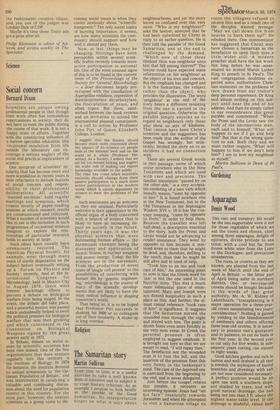Advertising
Award winners
Philip Kleinman
The advertising awards season is upon us again. Last Thursday night the ball started rolling with the National Broadcast Advertising Festival, and by the time these words appear the Advertising Creative Circle will have picked its own winners. A little later on, in June, the Designers and Art Directors Association will announce a further selection of prize Press ads and TV commercials culled from the same annual crop that the other bodies have been casting their eyes over.
The subject of awards is always good for a slanging match in Adland. There is always a substantial body of opinion, largely consisting of ad agency men who haven't won awards, that too much emphasis is placed upon them, too much publicity is given to them, they are no indication of which ads are commercially effective, and the wrong people get them anyhow.
The object of advertising, say these sensible chaps, is to shift the product, not pile up certificates of merit. Obviously right? Well, actually, no — not, that is, if you're a bright young copywriter or creative director. If you are bright, it won't take you long to work out that the principal object of advertising is to shift money into your own pocket and that the quickest way of achieving this desirable end is to deck yourself out with the maximum number of awards in the shortest possible time, thus putting up your market value in the eyes of potential employers.
For the sad fact is that, although Brunning Advertising arguably does as good a job for Tesco with its hard-sell newspaper ads as -J. Walter Thompson does for Guinness with its original, humorous commercials and pieces of sophisticated colour supplement wit, nobody from Brunnings ever doubled his salary overnight on the strength of having worked on the Tesco account. Not so very long ago, however, one Chris Wilkins did double his salary by moving from JWT to Boase Massimi Pollitt, which latter agency had been chiefly impressed by his work on the award-winning Guinness campaign. And Tom Rayfield, who is shortly moving from JWT to become head of the creative department at Lintas, at a salary not very far below £15,000, also built up his reputation on those delicious Guinness ads.
Not that any advertising awards officially set out to be prizes for wit, originality or sophistication as such. The Broadcast Awards, for instance, are given for "the effective communication of good advertising ideas". In practice if not in theory, however, this tends to mean wit, and originality, about which there can be some measure of agreement, rather than commercial effectiveness, about which there is frequently none.
A more bitter objection to the awards system is not that the prizes are given for the wrong reasons but that they are given to the wrong people. There is frequently alleged to be a clique of creative people in a handful of fashionable agencies which has somehow gained control of the awards system and turned it in effect into a mutual admiration society. It would be easier to deny that this was so if it were not the case that both judges and prizewinners appear to come with monotonous regularity from the same agencies. In the Designers and Art Directors Association and the Broadcast Festival judges are not expected, as they would be in a court of law, to lean over backwards to avoid any imputation of favouritism. (The Creative Circle gets round the problem by making all its members judges.) Thus on Thursday night Broadcast awards were given for the first time for radio commercials, and lo and behold two of the prizewinning directors, Tony Hertz (who got the Gold for a Squezy spot) and Jeremy Rose, were among the judges. As far as it was possible to make out over the din created by the large and well oiled audience of loquacious admen at the Grosvenor House Hotel, none of the commercials was worth the effort of turning the knob on your set to hear.
In the more important TV section the Golds went to agency Davidson Pearce Berry and Spottiswoode (the same one responsible for the Squezy radio spot) for a Brooke Bond PG Tips commercial, complete with chimps, and • to Collett Dickenson Pearce for two nostalgic Hovis commercials. Both agencies are generally reckoned to belong to the fashionable creative clique, and, yes, one of the judges was Lindsay Dale of CDP.
Maybe it's time those Tesco ads got a prize after all.
Philip Kleinman is editor of Adweek and writes weekly in The Spectator.



































 Previous page
Previous page